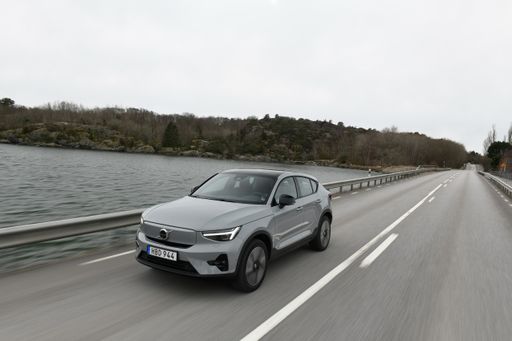Toyota Prius vs Volvo EC40 – Performance, range & efficiency compared
Compare performance, boot capacity, efficiency and price at a glance.
Find out which car is the better choice for you – Toyota Prius or Volvo EC40?
Costs and Efficiency:
When it comes to price and running costs, the biggest differences usually appear. This is often where you see which car fits your budget better in the long run.
Toyota Prius has a somewhat advantage in terms of price – it starts at 39400 £, while the Volvo EC40 costs 46600 £. That’s a price difference of around 7200 £.
As for range, the Volvo EC40 performs convincingly better – achieving up to 584 km, about 498 km more than the Toyota Prius.
Engine and Performance:
Power, torque and acceleration are the classic benchmarks for car enthusiasts – and here, some clear differences start to show.
When it comes to engine power, the Volvo EC40 has a convincingly edge – offering 442 HP compared to 223 HP. That’s roughly 219 HP more horsepower.
In acceleration from 0 to 100 km/h, the Volvo EC40 is significantly quicker – completing the sprint in 4.60 s, while the Toyota Prius takes 6.80 s. That’s about 2.20 s faster.
In terms of top speed, the Volvo EC40 performs hardly perceptible better – reaching 180 km/h, while the Toyota Prius tops out at 177 km/h. The difference is around 3 km/h.
Space and Everyday Use:
Whether family car or daily driver – which one offers more room, flexibility and comfort?
Both vehicles offer seating for 5 people.
In curb weight, Toyota Prius is noticeable lighter – 1620 kg compared to 2065 kg. The difference is around 445 kg.
In terms of boot space, the Volvo EC40 offers evident more room – 404 L compared to 284 L. That’s a difference of about 120 L.
When it comes to payload, Volvo EC40 to a small extent takes the win – 435 kg compared to 375 kg. That’s a difference of about 60 kg.
Who wins the race?
The Volvo EC40 proves to be is largely superior and therefore becomes our DriveDuel Champion!
Volvo EC40 is the better all-rounder in this comparison.

Volvo EC40
Toyota Prius
The Toyota Prius stands as a pioneer in the realm of hybrid vehicles, offering an eco-friendly driving alternative with its innovative technology. Its aerodynamic design and comfortable interior make it a practical choice for those looking to reduce their carbon footprint without sacrificing style. Additionally, the Prius boasts a reputation for reliability and efficiency, contributing to its lasting popularity among environmentally conscious drivers.
details @ Toyota
@ Toyota
 @ Toyota
@ Toyota
 @ Toyota
@ Toyota
 @ Toyota
@ Toyota
Volvo EC40
The Volvo EC40 seamlessly combines cutting-edge technology with sleek Scandinavian design, offering a refined driving experience. With its advanced safety features and user-friendly infotainment system, this model caters to both seasoned drivers and modern tech enthusiasts. The vehicle's impressive efficiency and environmentally conscious engineering make it a standout choice for those seeking sustainability without compromising on style.
details @ media.volvocars.com
@ media.volvocars.com

|

|
|
|
|
Costs and Consumption |
|
|---|---|
|
Price
39400 - 45800 £
|
Price
46600 - 59000 £
|
|
Consumption L/100km
0.5 - 0.7 L
|
Consumption L/100km
-
|
|
Consumption kWh/100km
-
|
Consumption kWh/100km
16.2 - 17.3 kWh
|
|
Electric Range
72 - 86 km
|
Electric Range
488 - 584 km
|
|
Battery Capacity
-
|
Battery Capacity
67 - 79 kWh
|
|
co2
12 - 17 g/km
|
co2
0 g/km
|
|
Fuel tank capacity
40 L
|
Fuel tank capacity
-
|
Dimensions and Body |
|
|---|---|
|
Body Type
Hatchback
|
Body Type
SUV
|
|
Seats
5
|
Seats
5
|
|
Doors
5
|
Doors
5
|
|
Curb weight
1620 - 1630 kg
|
Curb weight
2065 - 2185 kg
|
|
Trunk capacity
284 L
|
Trunk capacity
404 L
|
|
Length
4599 mm
|
Length
4440 mm
|
|
Width
1782 mm
|
Width
1873 mm
|
|
Height
1470 mm
|
Height
1591 mm
|
|
Max trunk capacity
-
|
Max trunk capacity
1196 L
|
|
Payload
365 - 375 kg
|
Payload
395 - 435 kg
|
Engine and Performance |
|
|---|---|
|
Engine Type
Plugin Hybrid
|
Engine Type
Electric
|
|
Transmission
Automatic
|
Transmission
Automatic
|
|
Transmission Detail
CVT
|
Transmission Detail
Reduction Gearbox
|
|
Drive Type
Front-Wheel Drive
|
Drive Type
Rear-Wheel Drive, All-Wheel Drive
|
|
Power HP
223 HP
|
Power HP
238 - 442 HP
|
|
Acceleration 0-100km/h
6.80 s
|
Acceleration 0-100km/h
4.6 - 7.3 s
|
|
Max Speed
177 km/h
|
Max Speed
180 km/h
|
|
Torque
-
|
Torque
420 - 670 Nm
|
|
Number of Cylinders
4
|
Number of Cylinders
-
|
|
Power kW
164 kW
|
Power kW
175 - 325 kW
|
|
Engine capacity
1998 cm3
|
Engine capacity
-
|
General |
|
|---|---|
|
Model Year
2023
|
Model Year
2024
|
|
CO2 Efficiency Class
B
|
CO2 Efficiency Class
A
|
|
Brand
Toyota
|
Brand
Volvo
|
Is the Toyota Prius offered with different drivetrains?
Available configurations include Front-Wheel Drive.
The prices and data displayed are estimates based on German list prices and may vary by country. This information is not legally binding.
